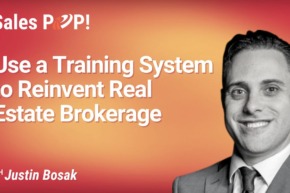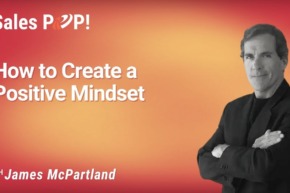In a world where everyone seems to be an “expert,” the term coaching is often overused and misunderstood. Is it just a glorified form of advice? A shortcut to success? Or something far more transformative? To get to the heart of what authentic, effective coaching looks like, Sales POP’s John Golden sat down with Chris Prefontaine, the founder of The Smart Real Estate Coach and a three-time Inc. 5000 honoree.
Their conversation was a masterclass in separating coaching reality from coaching hype. We’ve distilled the most powerful insights from their discussion into a guide for anyone looking to hire a coach, become a coach, or understand the profound value of a strong coaching relationship.
1. What Coaching Is—and What It Isn’t
Forget what you think you know about coaching. This isn’t a sports coach yelling instructions from the sidelines. In business and real estate, coaching is a nuanced, collaborative partnership built on trust and a shared vision.
Coaching is NOT:
- Just advice: A coach doesn’t simply tell you what to do. They guide you toward the right answers and help you develop your problem-solving skills.
- A “do it yourself” program: It’s an active partnership, with the coach helping you create a detailed, actionable plan.
- A quick fix: Sustainable success is a marathon, not a sprint. Authentic coaching is a long-term process, not a one-time event that promises instant results.
What real coaching looks like:
- Strategic planning: You and your coach work together to set specific, measurable goals with clear deadlines.
- Consistent support: It involves regular check-ins, honest feedback, and making adjustments to the plan as you go.
- Unwavering accountability: Progress is tracked, and obstacles are addressed head-on.
2. The Right Coach Is More Than an Expert—They’re a Guide
Choosing the right coach is one of the most critical decisions you’ll make. Chris Prefontaine emphasizes that a great coach offers more than just a certificate or a flashy title.
Look for someone who has:
- Been there, done that: Find a coach who has already achieved what you’re striving for. Someone who has successfully navigated the path you’re on, especially through economic ups and downs, brings invaluable real-world perspective.
- Similar values: Expertise is important, but integrity is non-negotiable. Your coach should operate with a set of values and ethics that align with your own.
- A holistic approach: The best coaches care about your entire life, not just your bottom line. They understand that personal and professional growth are deeply intertwined.
Actionable tips for finding your coach:
- Vet their track record: Ask about their real-world experience. Are they still actively involved in the field, or are they teaching outdated methods?
- Assess their empathy: Can they relate to your struggles and aspirations on a human level?
3. Accountability: The Engine of Success
Without accountability, even the best-laid plans crumble. It’s the cornerstone of a successful coaching relationship. Chris Prefontaine’s approach to accountability is interactive and rooted in a cycle of action, critique, adjustment, and renewed action.
How to build accountability:
- Set clear, time-bound goals: Every objective needs a deadline.
- Establish regular reporting: Use calls, messages, or meetings to track progress and challenges.
- Embrace feedback: Be willing to accept constructive criticism, even when it’s uncomfortable.
Chris shared an example of a client who sent him daily voice messages to report on his progress. This created a rapid feedback loop that accelerated his growth and results.
4. Overcoming Mindset Barriers and Mismanaged Expectations
Two major obstacles often derail people before they even start their coaching journey: self-doubt and unrealistic expectations.
- Self-doubt: The belief that “I can’t do it” is a powerful blocker. Coaching helps you reframe this thinking and build confidence through small, consistent wins.
- Unrealistic expectations: The “get rich quick” culture, fueled by social media highlight reels, sets people up for disappointment. They expect overnight success and get impatient when it doesn’t happen.
Expert advice for a winning mindset:
- Embrace incremental progress: True, lasting change takes time and sustained effort.
- Be wary of shortcuts: Success stories that promise instant results are the exception, not the rule.
- Commit to the process: Think of coaching like learning a new skill or earning a degree—it requires years of dedication.
5. Are You Coachable? The Ultimate Litmus Test
Not everyone is ready for coaching, and that’s okay. Chris’s team uses a thorough application process to gauge a client’s readiness.
You are coachable if you:
- Are willing to be held accountable: You understand that you are the one responsible for your results.
- Receive feedback openly: You’re willing to act on advice, even when it challenges your assumptions.
- Maintain transparency: You’re open and honest about your struggles and successes.
6. Common Pitfalls and How to Avoid Them
Chris and John identified several traps that can derail a coaching relationship:
- External negativity: Letting uninformed opinions and distractions from your friends or family influence your journey.
- Impatience: Underestimating the time and effort required for real change.
- Poor information hygiene: Consuming “get rich quick” content that distorts reality and creates unrealistic expectations.
The solution? Be selective about the information and influences you allow into your life. Focus on your own journey, not the “highlight reels” of others.
7. Self-Investment: The Foundation of Success
John Golden shared a powerful reminder: no one cares about your career as much as you do. Waiting for an employer to invest in your growth is a losing strategy.
Actionable steps:
- Take ownership of your growth: Proactively seek out coaching, training, and resources.
- Invest in yourself: View self-improvement as a critical investment, not a luxury.
- Commit to lifelong learning: The most successful people never stop growing and evolving.
Coaching as a Journey, Not a Destination
The conversation between Chris Prefontaine and John Golden drives home a clear and powerful message: coaching is not a shortcut to instant results. It’s a collaborative, accountable journey of continuous improvement.
Whether you’re an entrepreneur, an aspiring leader, or just looking to grow, a great coach can be the catalyst for real, lasting change. The key is to find the right partner, commit to the process, and invest in yourself.
What do you think is the single most important quality a coach should have?
Our Host
John is the Amazon bestselling author of Winning the Battle for Sales: Lessons on Closing Every Deal from the World’s Greatest Military Victories and Social Upheaval: How to Win at Social Selling. A globally acknowledged Sales & Marketing thought leader, speaker, and strategist, he has conducted over 1500 video interviews of thought leaders for Sales POP! online sales magazine & YouTube Channel and for audio podcast channels where Sales POP! is rated in the top 2% of most popular shows out of 3,320,580 podcasts globally, ranked by Listen Score. He is CSMO at Pipeliner CRM. In his spare time, John is an avid Martial Artist.












Comments